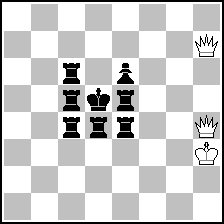|
|
| (1) Posted by Hauke Reddmann [Wednesday, Jan 28, 2015 17:59] |
Most easy longmover?
Filip Bondarenko, Feenschach 1960
 (= 3+8 ) (= 3+8 )
#21 - no solution needed - cmon :-) -
also qualifies for hon. ment. in sillyness -
do you have a suggestion for a simpler longmover? (Fairy is OK.)
Hauke
|
|
| (2) Posted by seetharaman kalyan [Wednesday, Jan 28, 2015 18:53]; edited by seetharaman kalyan [15-01-28] |
It is indeed funny! There is atleast the try 1.Qd7+? :) One more problem which one can solve faster than Popeye!
|
|
| (3) Posted by Hauke Reddmann [Thursday, Jan 29, 2015 12:59] |
Popeye is a somewhat handicapped benchmark here;
does anyone has an actual time for, say, Gustav?
("Unintelligent" mode, of course.)
|
|
| (4) Posted by Frank Richter [Thursday, Jan 29, 2015 13:01] |
My Gustav solves this in automatic mode in 00.65 sec.
What means immediately in my opinion ...
|
|
| (5) Posted by Sven Hendrik Lossin [Thursday, Jan 29, 2015 13:06]; edited by Sven Hendrik Lossin [15-01-29] |
Why unintelligent mode (it takes Gustav about a second in the intelligent mode)?
Do you also solve in unintelligent mode, Hauke? ;-)
P.S. But it is by no means the easiest. If I am not wrong there are moremovers in which white and black are forced to do the right moves.
|
|
| (6) Posted by Jan Hein Verduin [Thursday, Jan 29, 2015 18:21] |
Well, there's this rather well known joke:
V. Röpke
Skakbladet
1942
 (= 6+4 ) (= 6+4 )
±6
|
|
| (7) Posted by Olaf Jenkner [Thursday, Jan 29, 2015 23:46] |
@Frank,
do not use too much hashtables.
With minimum size 4 MB Gustav found the solution in 0.01 seconds.
|
|
| (8) Posted by Torsten Linß [Friday, Jan 30, 2015 07:46]; edited by Torsten Linß [15-01-30] |
Popeye finds the key in the Bondarenko-#21 in 0.4 sec.
SK, did it really take you less?
|
|
| (9) Posted by seetharaman kalyan [Friday, Jan 30, 2015 10:08] |
No. I used more than a minute to solve. But my Popeye took much longer. I stopped as it showed no response after 5 min. Perhaps something to do with my computer speed !
|
|
| (10) Posted by Nikola Predrag [Friday, Jan 30, 2015 13:19] |
Seetharaman, add Condition WhiteUltraSchachZwang to Popeye.
|
|
| (11) Posted by Hauke Reddmann [Friday, Jan 30, 2015 14:14] |
...which would be cheating. ;-)
Wow, are computers fast today. (The Bondarenko, arguably, is
advantageous for a computer because the many rooks quickly
shove all non-check attempts of White over the 21# limit
by giving checks themselves. Any intelligent program will
try those first, and only one refutation is needed. That,
of course, is not cheating :-)
Human also would have the disadvantage that they must write
down the solution (which takes much longer than actually
solving it).
I rephrase: Do you know a chess problem which a human still can
solve faster than a computer?
Hauke (who solves with MateMaster, where 6# already take minutes -
but since he only composes 2# anyway, it's more comfortable than
Popeye :-)
|
|
| (12) Posted by Nikola Predrag [Friday, Jan 30, 2015 17:54] |
Hauke, why cheating? The program can have it set as a default, to start solving by trying first the series of checks.
|
|
| (13) Posted by seetharaman kalyan [Friday, Jan 30, 2015 19:21] |
Yes Hauke. When I published this SH#16 I predicted that any average solver will solve it in a few minutes. Popeye took more than 20 mins. http://i.imgur.com/pv4Gkjb.png
Enjoy the solution and the 'motto' of the problem!
|
|
| (14) Posted by Hauke Reddmann [Saturday, Jan 31, 2015 17:41] |
@Nikola: OK, if the n# solver tries white checks first
for any problem, it's no cheating (I momentarily
confused it with proving correctness).
@Seetharaman: Yup. One minute.
|
|
| (15) Posted by Torsten Linß [Saturday, Jan 31, 2015 19:07]; edited by Torsten Linß [15-01-31] |
Actually, adding the condition WhiteUltraSchachZwang would alter the problem.
[Though not the solution.] This is not the way to go as it anticipates knowledge
of the solution.
The correct way in Popeye is to use options.
Either option threat 0
or option nontrivial 0 0
|
|
| (16) Posted by Nikola Predrag [Sunday, Feb 1, 2015 03:15] |
It doesn't anticipate the solution of the problem, it just starts solving by trying the series of checks.
In some other problem the solution would not be a series of checks.
And what actually mean the mentioned "correct" options?
I tried both of them for solving an ordinary #5 and very quickly the solution was NOT found.
Do not these options anticipate the knowledge of the solution?
|
|
| (17) Posted by Joost de Heer [Sunday, Feb 1, 2015 16:11] |
Unto Heinonen published a s#50 double maximummer in Die Schwalbe in 2000 in which all moves were forced.
http://timkr.home.xs4all.nl/chess2/diary_7.htm, item #130.
|
|
| (18) Posted by Olaf Jenkner [Monday, Feb 2, 2015 18:16] |
Use
http://pdb.dieschwalbe.de/search.jsp?expression=probid=%27P1008770%27
for autoplay.
|
|
| (19) Posted by Joost de Heer [Monday, Feb 2, 2015 18:59] |
The stipulation is actually wrong. The correct stipulation, as printed, is 's#, double maximummer', so without the number of moves.
|
|
| (20) Posted by Olaf Jenkner [Tuesday, Feb 3, 2015 07:59] |
You're right. I corrected it in PDB.
|
|
No more posts |
MatPlus.Net  Forum Forum  Moremovers Moremovers  Most easy longmover? Most easy longmover? |
 ISC 2024
ISC 2024 Forum
Forum  Moremovers
Moremovers  Most easy longmover?
Most easy longmover? 


